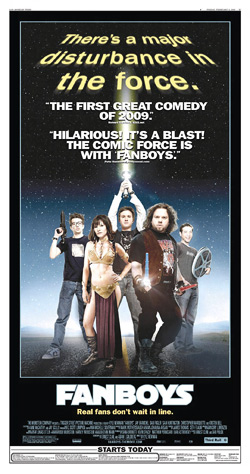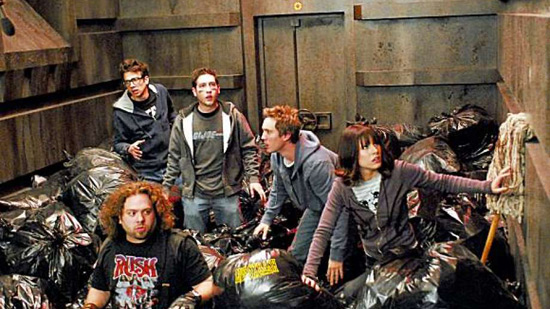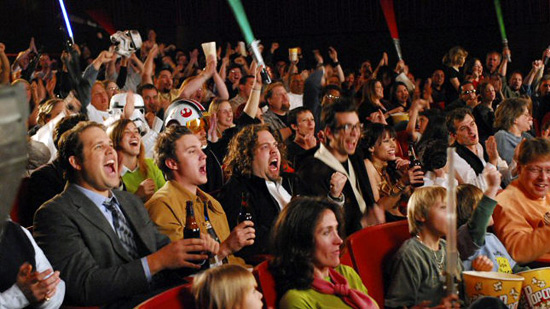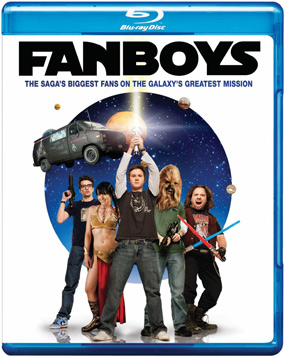Coate: Is Fanboys significant in any way?
Hasan: Significant more for the behind-the-scenes struggles that dogged its road to the screen rather than anything in the film itself. And even then, "significant" may be overstating it. I do think it’s fair to say that a movie like Fanboys simply wouldn’t exist in the post-Disney era, and that itself is somewhat significant. It’s an artifact of a time when the franchise’s fate was the sole purview of one man, and that one man could decide how much or how little of his Empire’s credibility could be extended to something like this.
Kaminski: I think it’s significant in that it’s difficult to think of another film that so precisely targets a specific franchise as the driving force and background environment a film is set in. I’m not sure how the Lucasfilm licensing works, if they actually got permission or if it falls under fair use — they couldn’t use the official Star Trek costumes, which is why they have the Star Trek cosplayers in close-but-not-quite versions of the uniforms, so to me that says they must have worked out an arrangement prior (I wish I could give a more definitive answer here). Especially the final scene at Skywalker Ranch with rooms full of props and memorabilia. It also hosts an impressive number of celebrity cameos, which may seem like a cheap gimmick now, but when more and more of them pass on I think this aspect will have a lot more value — re-watching the film for this feature, it was bittersweet to see Carrie Fisher again, and even though this is a morbid subject matter, it won’t be long before we have the same feelings towards Bill Shatner, Peter Mayhew, or Billy Dee Williams.
I hate to keep bringing it up, but I think the lengthy years-long post-production battle is also quite significant, and this is usually what I remember when I think of the film. It’s a fascinating look at the trials that young indie filmmakers often have to go through when dealing with a strong-arm studio big-shot like Harvey Weinstein. It also shows how the fandom can band together to affect positive change. The Star Wars fandom is currently infamous for its toxicity, but Fanboys was saved by, well, the fanboys (and fangirls) coming together and protesting and petitioning the Weinstein company to not gut the film and turn it into a total college road-trip comedy. The additional comedy scenes remained in the film, of course, but Kyle Newman was allowed a day or two to put many of the original character development scenes and the cancer sub-plot back in, and it was only because Star Wars fans got together and rallied to his defense. I think the fandom today could take a few notes from the positive attitude of that era.
Watters: As I noted in [my answer to the first question], it’s significant in that it shows how fandoms can argue without completely going toxic. And as an added bonus, it shows how William Shatner is happy to play in genre pieces, regardless of which way it’s leaning. It’s to the credit of both films as well as Boston Legal that people were able to move past the infamous SNL skit.
 Coate: Where do you think Fanboys ranks among homage, tribute and parody films?
Coate: Where do you think Fanboys ranks among homage, tribute and parody films?
Hasan: It’s part of the long tradition of "road trip" movies, with an added bit of interest due to the Star Wars plot. To me it feels like something in the vein of Detroit Rock City (although I liked Fanboys more) in that it’s depicting something that I doubt you’d have the awareness of its importance unless you were around to live through it.
Kaminski: That’s a very interesting question, as it occupies a fairly unique space in that genre. It’s a homage, a tribute, and a satire, but it also exists in an exaggerated version of the real world where the subject is acknowledged as a work of fiction. It’s not Spaceballs or Galaxy Quest, which are parody films set in their own world, and it’s not a comedy documentary like Trekkies. All of those movies can be accessed by the general public who have only a casual knowledge of Star Wars and Star Trek. Fanboys falls squarely in the “by the fans, for the fans” camp, and as I mentioned earlier, indulges in “spot the reference.” In terms of the satire genre, it’s unique in this respect and appeals only to the hardcore initiates. The closest comparison I can think of is 1999’s Detroit Rock City, about a group of teens on a mission to sneak into a KISS concert, but that film dials it back and was meant for a mainstream audience.
Watters: I don’t really see it as a parody, unless you’re talking a parody of fandom after a fashion. It’s up near the top — I’d probably put it just behind Free Enterprise and Galaxy Quest (the latter of which I really do put into the same category).
Coate: What is the legacy of Fanboys?
Hasan: In many ways it’s a forerunner of today’s "let’s make a movie!" ethos where anyone with a smart phone and an idea can potentially get something made. Fanboys started with one interesting idea followed by an improbably journey to the screen. And while Kyle Newman’s original vision was in danger of being compromised along the way thanks to various Hollywood factors, it’s nonetheless an inspiration that he was able to sell enough people on that initial idea that even the man himself, George Lucas, was won over by it and offered his support.
Kaminski: As a hardcore Star Wars fan, it’s a fun movie to watch as long as you keep your expectations in check. It’s not a particularly great film, the low budget is obvious, some of the humor doesn’t work, and the script is full of clichés. So, on its own, it’s nothing special. But, I’m the target audience, and I think part of the appeal is in the “spot the reference” gimmick; I would say the film uses this as a major crutch, but I think that’s also kind of the point of the film — a love letter to Star Wars and nerd culture in general. And even though the themes of growing out of adolescence are tired and clichéd, they still kind of work.
I think the film would have more lasting significance if it had just come out sooner. As I said, sometimes the film feels like a Star Wars themed episode of Big Bang Theory as written and directed by Kevin Smith in 2001. That was the same year Jay and Silent Bob Strike Back came out, which is funnier and better written, and even has some plot similarities in the road trip format. If this film had come out in its place, it would have been successful, and more fondly remembered. But by 2009, people didn’t care about Phantom Menace anymore, Star Wars was considered to be over-and-done-with, as George Lucas swore up and down there would never be any more movies, and even the aforementioned Big Bang Theory had been on the air for two years already (this was at a point where nerd culture hadn’t quite rejected the show yet, but was instead thankful to at least see itself represented in a hit TV show). The original plan of releasing it in 2006 would have made it more relevant, as the prequels wrapped up the year prior and were still lingering in people’s minds a little bit, and the humor would have seemed less dated. I prefer to judge it on the basis of a film from 2006, rather than 2009; this may seem like a minor difference, but I think audiences taste in humor shifted a bit in between then, especially since a lot of people saw it on video years after 2009.
I think the biggest impression the film makes is that it’s not just dropping a fair-use reference the way a show like Big Bang Theory or Community would, but it full out uses every aspect of the licensed subject, down to sound effects, props and costumes. It’s a bit of a miracle, really, and even though that’s a superficial compliment, it really informs the film with an undeniable special quality. Ten years out, it’s hard to say what its legacy will be. I feel as though it hasn’t quite become the cult hit that I expected it to be; it’s not something that a lot of Star Wars fans enthusiastically share with each other, or talk about. I feel like it deserves more of a cult status amongst Star Wars fans, as we’re really the only audience the film was made for. Maybe its tenth anniversary will be the reminder fans need. If you’re a Star Wars fan and you haven’t seen, then you should; and if you already have, and you found it bland and forgettable, I would recommend a second look. With this entirely new phase In the Disney era, 1999 seems quaint and nostalgic.
Watters: It’s also the advent of Ready Player One scribe Ernie Clyne, who wrote the Fanboys story and screenplay. It’s an example of fans being inspired to write, and create. There’s any number of examples of individuals who were inspired by various films, shows, and franchises, and Fanboys is proof positive that following one’s love for fandom, even while stuck in a mundane day job (while he was working as a technical support rep for a computer company), that they can also wind up being artists. While Star Trek fans often cite that their fondness for their show led them towards being scientists and researchers, it’s the Star Wars fans that followed their dreams that will more often than not go into visual effects, writing, and the entertainment industry in general. Fanboys’ legacy is reminding everyone that if something ignites a passion and a dream in them, they should follow it, because even in the attempt, great things can happen.
Coate: Thank you — Zaki, Michael, and Bill — for sharing your thoughts about Fanboys on the occasion of its 10th anniversary.
IMAGES
Selected images copyright/courtesy Picture Machine, Trigger Street, Vivendi Entertainment, The Weinstein Company, The Weinstein Company Home Entertainment.
- Michael Coate
Michael Coate can be reached via e-mail through this link. (You can also follow Michael on social media at these links: Twitter and Facebook)







